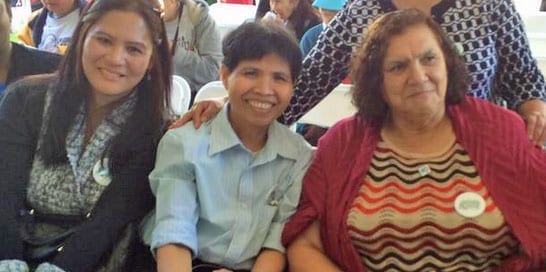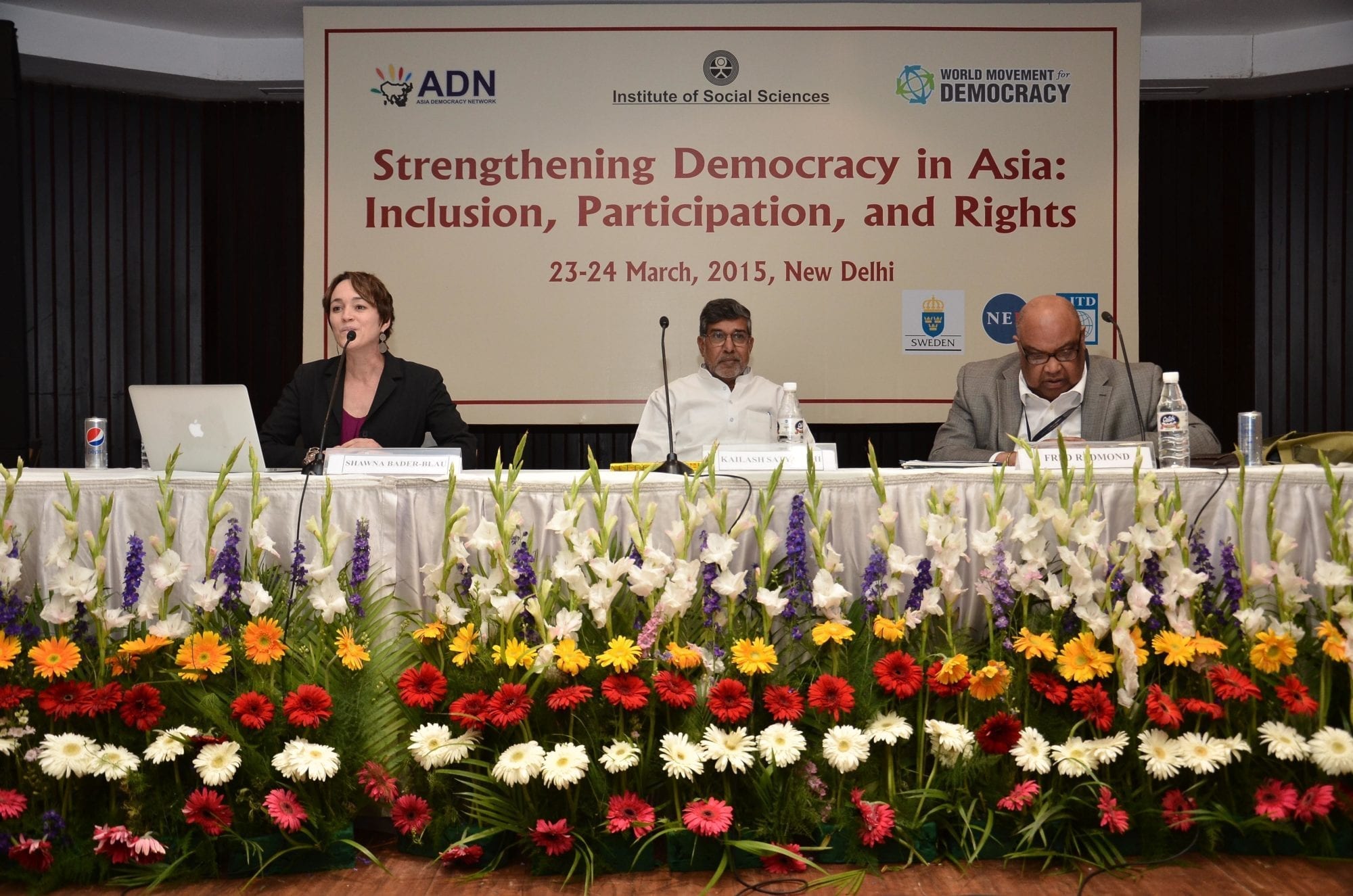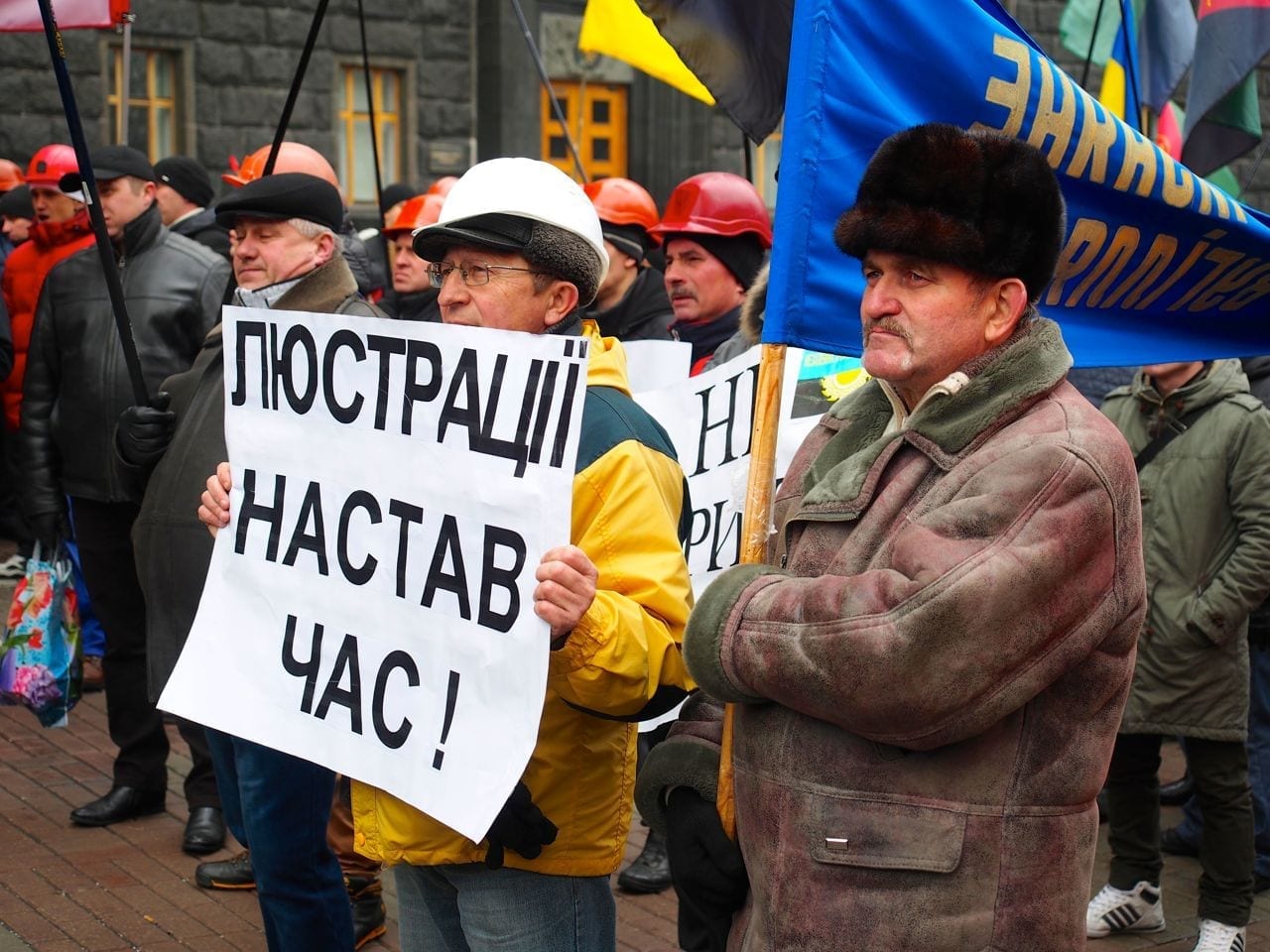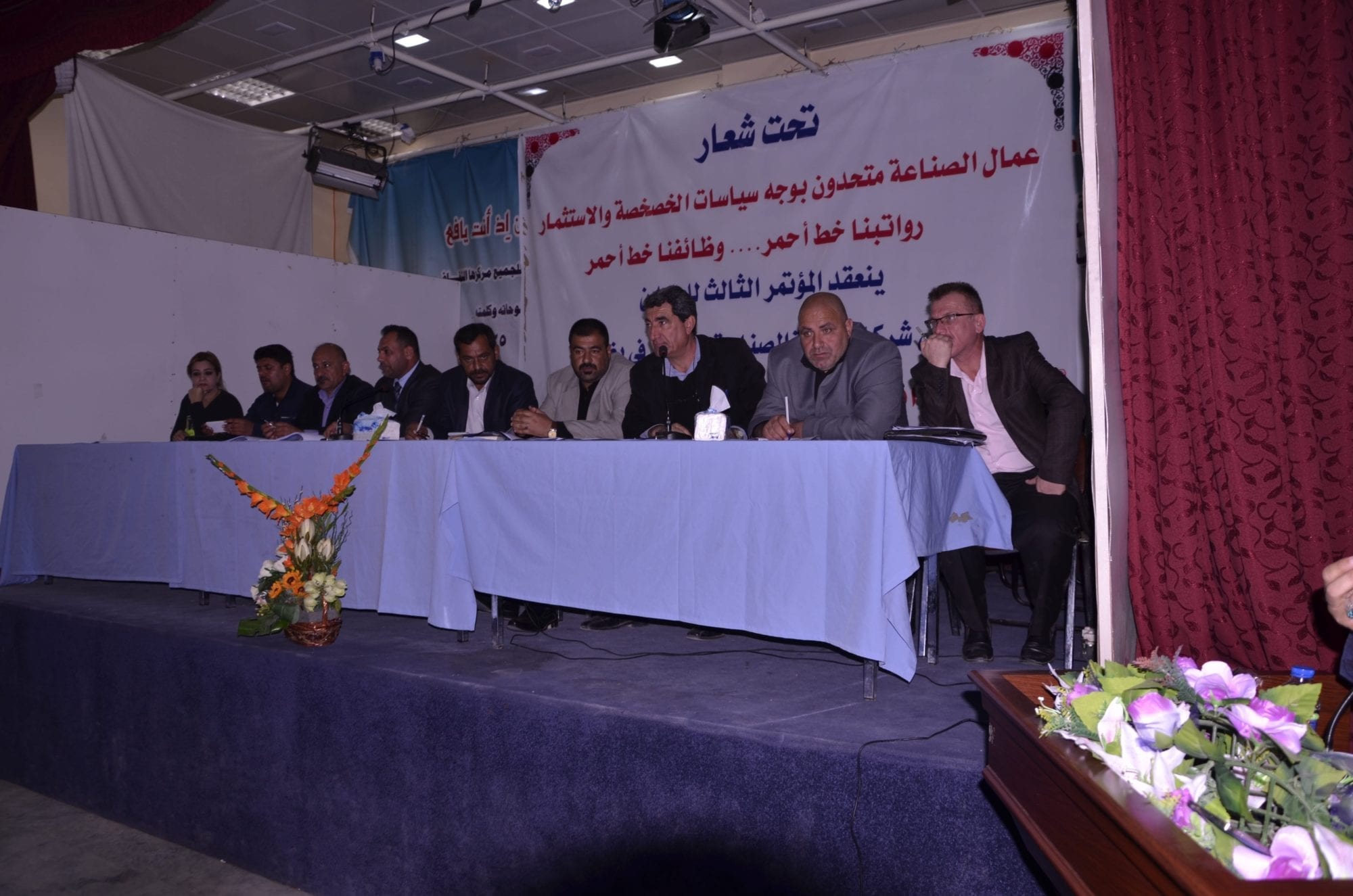
Mar 26, 2015
Gender-based violence on the job occurs far more often than most people realize, and domestic workers—isolated in individual homes—are especially vulnerable to abuse, said domestic workers, union organizers and experts Wednesday at a panel discussion focusing on women and violence at work.
“They treated us like slaves,” said May Joy Guarizo Salapare, describing her experience as a domestic worker for a family in Saudi Arabia.
When Guarizo arrived in Saudi Arabia from the Philippines, her employer refused for months to let her call her family to let them know she was safe or to contact the labor recruiting agency that arranged her job. Meanwhile, Guarizo and another domestic worker from the Philippines worked every day from 6 a.m. until midnight, when the employer locked them in their room. The employer’s son continually tried to corner Guarizo in the pantry and other areas where he could assault her.
After Guarizo finally managed to contact the labor agency, she was sent home with no money. Only through the kindness of passengers on the plane, could she pay for a taxi from the airport.
Guarizo—one of the panelists at the Gender-Based Violence in the Workplace discussion held at the Solidarity Center in Washington, D.C.—says she is working to ensure that others do not endure the treatment she suffered, conditions all too common for the world’s 52 million domestic workers, most of whom are women. Today she is a member of the Domestic Workers’ Network in Jordan and the United Filipino Workers Association in Jordan.
Guarizo was joined on the panel by Sehamin Irene Dominique Flora Tieu To, an Ivory Coast native and active member of the Coalition of Migrant Workers in Morocco; Bama Athreya, senior specialist for Labor and Employment Rights at the U.S. Agency for International Development (USAID); and Robin Runge, a U.S.-based attorney who specializes in gender-based violence. Lisa McGowan, Solidarity Center senior specialist for gender equality, moderated.
Addressing violence directed at domestic workers is particularly difficult, panelists said, because women are reluctant to come forward for many reasons—including loss of employment, risk of further abuse by the employer or labor recruiter and culturally driven shame about discussing such details in public.
Tieu To, who as a domestic worker was trapped in her employer’s house in Morocco after he took her passport, described herself as “one of the lucky ones.” She was forced to sleep in a room that was a “glorified closet” and was not paid after the first two months’ work, but left without being physically abused. She is now reaching out to other domestic workers in Morocco to bring them into the Coalition of Migrant Workers, where they have access to legal and medical assistance, and hopes to expand the group’s outreach to Moroccan-born domestic workers.
Despite the prevalence of gender-based violence at work, few countries collect such data. “It is shocking how little data we have,” said Athreya. Yet data is essential for changing the prevailing attitude that the problem is limited to a handful of workers, she said.
Speaking from the audience, Marcel Sinzidi Amiyeto, the president of the Collectif des Travailleurs Immigres au Maroc (Coalition of Migrant Workers in Morocco), said it is important to keep in mind how the lack of family-supporting jobs in many countries and economic polices that impoverish people force so many workers to go abroad.
“Sometimes we forget to talk about why people leave their homes,” he said. “Unless we find out how we can solve those root issues, the problems will continue. We must raise awareness in the country of origin.”
Guarizo, Tieu To, Amiyeto, Phobsuk Gasing of the International Domestic Workers Federation and Myrtle Witbooi, general secretary of the South African Domestic Service and Allied Workers Union, participated in a weeklong exchange program in which they met with U.S. domestic workers in California, took part in the United Domestic Workers of America convention in Sacramento and held a roundtable with union organizers at the Solidarity Center in Washington, D.C. All were in the United States as participants on a U.S. Department of State Professional Fellows exchange to examine international models for overcoming the obstacles of reaching and organizing domestic and migrant workers.

Mar 25, 2015
The United States and India are connected by a common philosophy and a common history of resistance to oppression. And trade unions are key to greater equality and inclusion, said Fred Redmond, international vice president of the United Steelworkers, at a conference in Delhi this week that focused on how democracy in Asia can be strengthened through inclusion, participation and rights.
“Today in the United States and around the world, social cohesion is threatened by rising inequality and the economic and social marginalization of large segments of the population. The breakdown of institutions, such as labor unions, that promote equality and opportunity and participation, creates not only a skewed distribution of resources but also a breakdown of trust,” said Redmond, who joined with Nobel Peace Laureate Kailash Satyarthi Monday to explore the global march for dignity and democracy.
They highlighted the common thread running through social movements around the world: Gandhi’s philosophy of peaceful disobedience, which brought India independence, shaped the U.S. civil rights movement and continues to serve as a foundation for people around the world seeking justice and equality. Solidarity Center Executive Director Shawna Bader-Blau moderated their discussion.
Satyarthi, founder of Global March Against Child Labor and a lifelong campaigner for children’s rights, emphasized that the lack of economic security hinders the flourishing of democracy. When workers have no jobs, they also have no opportunities to join unions, which enable them to secure living wages and social protections like health care, said Satyarthi. He added that workers who lack economic security are often forced to send their children to work. The Solidarity Center has worked closely with Satyarthi for years to help end child labor.
Satyarthi and Redmond made their remarks as part of a panel discussion at the Strengthening Democracy in Asia conference organized by the Institute of Social Sciences (ISS), Asia Democracy Network and the World Movement for Democracy held March 23–24.
Also at the event, Solidarity Center Asia Director Tim Ryan moderated a panel discussion on strategies to promote democracy among marginalized workers featuring Redmond; Manali Shah, national secretary of the Self Employed Women’s Association (SEWA); and Ramachandra Khuntia, vice president of Building and Wood Workers International.

Mar 25, 2015
(Moscow, March 24, 2015)—The arrest and expulsion from Uzbekistan of an international labor rights expert raises serious concerns about the government of Uzbekistan’s commitment to international human rights conventions and the feasibility of the World Bank’s agricultural programs in Uzbekistan.
Uzbekistan operates what is perhaps the world’s largest state-organized system of forced labor, forcibly mobilizing more than a million of the country’s citizens to pick cotton each fall. When the World Bank initiated new loans to Uzbekistan’s agriculture sector last year, the Bank conditioned the loans on the Uzbek government following through on promises not to use forced labor in the areas where the Bank-funded projects will operate.
On March 19, the Uzbek government arrested, detained, deported and banned from the country Dr. Andre Mrost, an international labor rights consultant, whose firm, Just Solutions Network, Ltd., has bid on a contract to implement a feedback mechanism also called for under the terms of the World Bank loans.
“Three men in black entered the room, introducing themselves as officers of the Ministries of Justice and Labor and accompanied by three policemen. They demanded my passport and took me to the police station,” Dr. Mrost reported. “The Labor Ministry representative interrogated me first, then the police, and finally the national security service. They forced me to sign a document I could not read, in Uzbek, and then escorted me to airport passport control, where my passport was stamped with an order prohibiting my re-entry to the country.”

Mar 20, 2015
In Ukraine, a first-of-its-kind worker rights center is serving a broad spectrum of working people through labor and human rights education, cultural events and hands-on support in resolving day-to-day workplace issues.
Launched in late 2013, the Labor Initiative drew more than 3,000 people to some 200 educational and community events in its first year. A project of Ukrainian trade unions and the Solidarity Center, the Kiev-based Labor Initiative now averages between eight and nine legal consultations and referrals per day. Allies include local Ukrainian trade unions from health care, education, mine working, construction, the informal economy and other sectors.
“The center has been an important improvement for us, for our capacity to support workers,” says Veniamin Tymoshenko, union activist and vice president of a national aviation crew union. “We have been able to rely on legal support on several key cases that helped us mobilize workers, fight corruption and press for democratic reforms.”
Most recently, the center has been assisting mineworkers displaced by fighting in eastern Ukraine, along with ongoing legal support to active mineworkers.
In one recent case, the center helped an injured mineworker obtain proper disability classification, enabling him to receive ongoing compensation. Despite his worsening condition, the mineworker had not been certified to receive assistance. Trade union leaders say that disability claims in Ukraine often are not honored because medical officials may work closely with employers who offer them financial payments to deny worker disability claims.
Wage theft and illegal firings are the most frequent workplace issues. An ongoing case involves a worker at a large auto parts company who was hired by a subcontractor and realized she was not receiving her full wages because her pay was off the books—the “double envelope” system widespread in Ukraine. When the worker brought the issue to tax authorities, the tax office warned her it likely would not inspect the company and, if it did, she would be charged with tax avoidance and fined.
Both union and nonunion workers can receive legal consultations through the support of the center’s network of labor attorneys. In addition, the center and Solidarity Center staff provide policy and research assistance to Ukrainian unions. The Labor Initiative gets the word out about its services by distributing pamphlets to union offices and at union meetings across the country, and also advertises its legal aid services in high traffic areas, such as on public transportation.
The center has become a community and education hub, hosting events seven days a week, providing a space for union and community group meetings and a weekly labor and social justice film club.
Unions are at the center of reform efforts in the country, and the Labor Initiative offers a key space where workers not only can receive individual workplace assistance but also join to collectively champion democracy.

Mar 18, 2015
Tens of thousands of workers in self-financed companies under Iraq’s Ministry of Industry who have not been paid for months are renewing their push for a long-term solution to the crisis, and many are looking to form unions.
Last fall, Iraq workers staged a series of protests to demand their wages. In February, some received one month’s pay, but the government declined to pass a budget that includes stable funding for workers in the companies.
Seeking a long-term solution, many workers are organizing and mobilizing in Baghdad, Bablyon, Wassit, Dewanya and Basra, with some starting to form unions, even though public-sector unions are illegal in Iraq, where the labor law of the Saddam Hussein regime is still on the books.
Supporting their unionization efforts are the General Federation of Iraqi Trade Unions (GFITU), Federation of Worker Councils and Unions in Iraq (FWCUI), General Federation of Workers and Unions in Iraq (GFWUI) and Iraqi Federation of Oil Unions (IFOU).
In a letter of solidarity to Iraq workers, Solidarity Center Executive Director Shawna Bader-Blau noted that Iraq is a member state of the International Labor Organization and thus obligated to adhere to Convention 87, which ensures freedom of association. (Arabic version)
“Collective action is the most effective means workers have to fight back and win,” wrote Bader-Blau.
At a recent conference hosted by FWCUI, workers agreed to several steps to meet short- and long-term economic challenges, including mobilizing mass demonstrations across Iraq to protest the proposed restructuring of government-owned companies, in which hundreds of thousands of workers likely will lose their jobs.
Iraqi workers have won international support for their struggle. In a letter to Iraq Prime Minister Haider al-Abadi, U.S. Labor Against the War, a coalition of 165 labor organizations in the United States, urged the government to assist self-financing companies to get loans and other economic support to enable them to pay employees.
“Iraq’s social stability and economic progress require that the standard of living and economic welfare of all its people be protected and improved,” the letter said.
In addition, the International Trade Union Confederation sent a letter of support, and USLAW sent a letter of support to Iraqi workers.
Click here for the English version of the AFL-CIO letter to al-Abadi and here for the Arabic.





